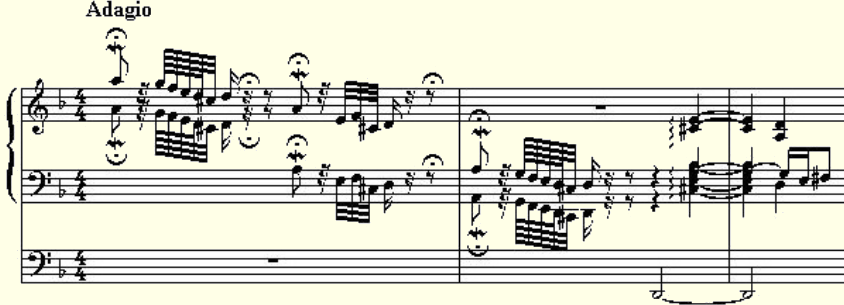
|
|
Toccata "A neighbor in the village tells me that I should protect myself against witches. Otherwise they could hit me with invisible darts that will get inside my veins and poison my blood. "The explanation for religious beliefs and behaviors is to be found in the way all human minds work," wrote Prof. Boyer. Atheists' minds included. This property of mind supports all sorts of variations in religious beliefs. "Having a normal human brain does not imply you have religion. All it implies is that you can acquire it." Atheists, so it appears to me, have a hard time to understand those fellow human beings who believe in a living God, the supreme being who created and rules the universe and is the judge of human mores. It is a notion that defies all logic. And monotheists tend to ridicule those who believe in a pantheon of gods and spirits with power over nature. 4 According to psychologist Alfred Adler (1870–1937) inferiority complex underlies the personal traits of all human minds and that the character of the individual is formed by a drive for superiority to overcome inferiority by a blend of responses.* 5 I am not suggesting that today's evolutionary psychologists either agree or disagree with Adler on this; I simply don't know. But the notion of a property of mind made me think of the language instinct, a widely accepted capacity described by Steven Pinker that all humans have for acquiring language.* As for inferiority complex, the term does not appear in the subject index of Boyer's book. 6 The foregoing led me to acquire another book by Pascal Boyer, "Minds Make Societies: How Cognition Explains the World Humans Create" (2018). A reviewer wrote "I particular like his balance and even-handedness in evaluating contending social theories." Prof. Boyer has been described as an evolutionary psychologist. Wikipedia tells us that: * * *
I am an old fogey who not only rambles a lot, but also associates a lot. It seems that a long life with many and varied experiences has given me much to associate. And so it may well be that me associating music with writing the way I am doing here strikes people as off the beam, so to speak. Without young peoples' urgent need to make a living, I do not quite share the same concerns to the same extent as they do. Maybe that is part of the reason why old old fogeys are habitually relegated to the sidings of everyday life. 8  J.S. Bach, Toccata and fugue in d-minor. The Oxford English Dictionary defines toccata as a composition for a keyboard instrument, intended to exhibit the touch and technique of the performer, and having the air of an improvisation. It underwent its highest development in Germany where it culminated in the work of Johann Sebastian Bach. The word toccata derives from the Vulgar Latin toccare, to touch. In music, fugue is defined as a contrapunctal composition in which a short melody or phrase (the subject) is introduced by one part and successively taken up by others and developed by interweaving the parts. And in psychiatry, fugue is a state or period of loss of awareness of one's identity, often coupled with flight from one's usual environment, associated with certain forms of hysteria and epilepsy. The word derives from the Latin fuga, flight. Human sensory perception is said to associate the d-minor chord with serious, pious, ruminating. melancholy, feminine, brooding worries, contemplation of negativity. 9 I am associating the power of toccata with the power of logic and fugue with a flight from seemingly logical reasoning to the underlying subconscious regions of innermost feelings; closer to such properties of mind Boyer and Pinker talked about, both of which, among many other properties underly the personal traits of all human minds. Properties are properties, be they physical or mental. Whether or not I am able to express such associations is not for me to judge. All I can do is give it a try. 10 * * *
FugueYou may recall these lines from Yuval Harari's "A Brief History of Humankind" which I quoted in a previous piece: Harari is an historian. Good for him, but understanding the subsequent development of these cultures calls for a more perfect objectivity. I am reminded of these lines by the Scottish bart Robbie Burns: O wad some Power the giftie gie us
To see oursels as ithers see us! Humans are fortunate that the giftie gave us science. The science of evolution lets humans step away from ourselves in the here and now although, wrote Boyer, "doing science is also difficult and frustrating, and in many ways goes against the grain of our spontaneous way of thinking. 12 It is a groping in the dark to seek a solution to a problem without understanding what that problem really is to begin with. This goes for problems among humans, societal problems, as well as for other kinds of problems, those addressed by physicists, chemists, and biologists; from the Big Bang up. As for the many seemingly intractable problems among humans, Pascal Boyer wrote that there is no good reason human societies should not be described and explained with the same precision and success of a thoroughly probed piece of research as applied to the rest of nature. Here are just some questions begging for answers: Beginning with a much simpler question: Why do so many people crave sweets? A spontaneous, common-sense answer: They like the taste. No argument there. But an evolutionary psychologist digs deeper: Humans evolved in environments in which sugar was so rare that taking all you could was a good strategy. Those who did extracted more calories and on average would thereby have a better opportunity for reproduction. Boyer: The Covid-19 pandemic makes the last one of those questions ("What makes politicians avoid or downplay the opinions and advice of experts?") stand out above the others. But even so, it is in entangled with our livelihood, or, more broadly speaking, "the economy," which I began addressing in the previous essay, "Rhapsody in Blue." 15 Another key to understanding the behaviors of a person is realizing that environment includes fellow humans as well as the body and mind of that very person himself/herself. The desire to light up a cigaret may be stimulated by somene else smoking and/or it may override a desire to reach for something sweet. Putting it differently, everything but the particular human property an evolutionary psychologist attempts to explain is considered its environment. 16 Going well beyond some simple act as, say, lighting up a cigaret, humans engaging in agriculture, or subjecting themselves to rulers, or learning technology, or what-have-you, extract much of their information from other humans—from educators, from collegues, from casual contacts, and so on. I could expand this paragraph to all sorts of human inclinations or drives, but I believe that by now you have a rudimentary picture. 17 It is common experience that we do not detect all of the information our environments provide all of the time. We'd go bananas. I don't care what outfit Suzie is wearing when I am sniffing a wine. The particular piece of information we seek is determined by one of our evolved detection systems. Dung beetles carry on eating and digesting dung entirely oblivious to what quails and warbles find important. (Yes, I stole this line from Boyer as I did the next example.) Salmon and eels can detect subtle changes in the concentration of salt in their surrounding water which is vital information for organisms that migrate between fresh and salt waters. But supposedly more complex organisms like ducks, otters and human swimmers do not detect such changes. 18 Observing a person's eyes can tell us what a person is looking at and thereby tell us something about a person's mental state such as is whether he or she is paying attention to you or to something else. It is process that involves many steps including an estimate of the ratio between the areas of the white scelera left and right of the eyes' irises, some subtle trigonometry for computing the direction of the gaze, the assumption that there is an unbroken straight line from iris to what is viewed. But, but, but, but ..., I'll copy here a paragraph from a story about how and why Westerners and East Asians—the Chinese in particular—view the world differently. Late in the year 2013, I began taking an interest in our Senate and then began writing an essay about what I learned about this part of our government and about how I feel it could serve Canadians better. It has received some favorable comments and yet, my recommendations bore no fruit. Ever since I have wondered just why that would be so. Might evolutionary psychology have already evolved to the point it can tell us why? 20 CodaWe live a double life with our subconscious deciding a fraction of a second how to act before we know it—a dense fog shrouding our social responsibilities, leaving us to defend what was, and the dream of what could be. 21
References |
--
| top of page |
|
